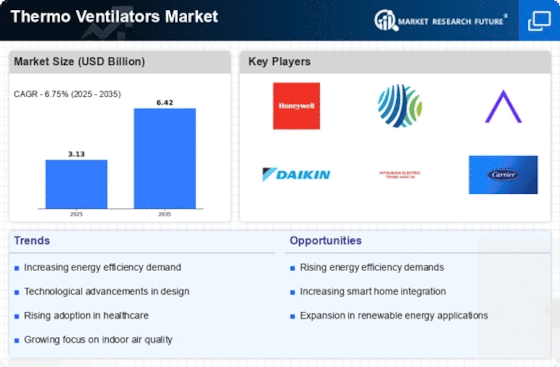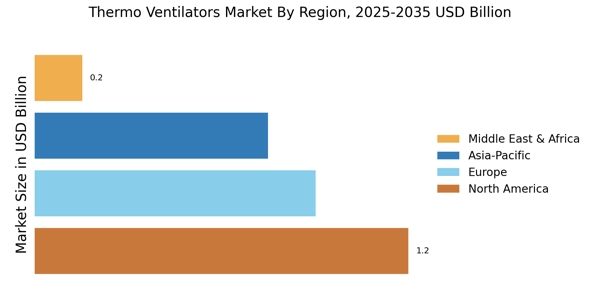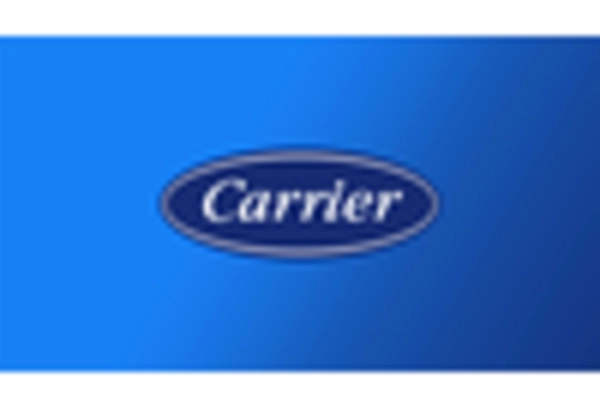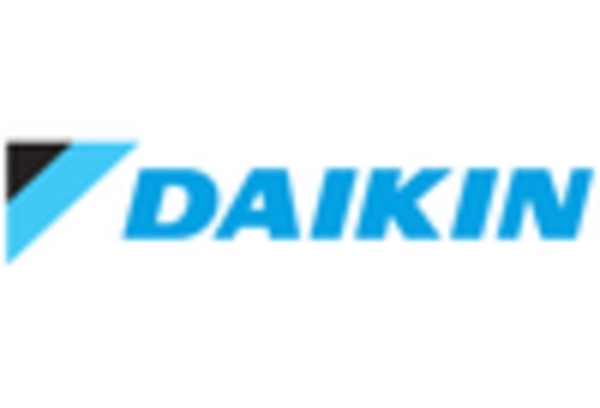Rising Demand for Energy Efficiency
The Thermo Ventilators Market is experiencing a notable surge in demand for energy-efficient solutions. As energy costs continue to rise, consumers and businesses alike are increasingly seeking products that minimize energy consumption while maximizing performance. This trend is further supported by various governmental initiatives aimed at promoting energy efficiency in buildings. For instance, regulations that mandate energy-efficient designs are likely to drive the adoption of thermo ventilators, which are designed to optimize indoor air quality while reducing energy usage. The market for energy-efficient ventilation systems is projected to grow significantly, with estimates suggesting a compound annual growth rate of over 7% in the coming years. This growing emphasis on energy efficiency is expected to propel the Thermo Ventilators Market forward.
Increased Awareness of Indoor Air Quality
The growing awareness of indoor air quality (IAQ) is significantly influencing the Thermo Ventilators Market. As individuals become more conscious of the health implications associated with poor air quality, the demand for effective ventilation solutions is on the rise. Studies indicate that inadequate ventilation can lead to various health issues, prompting consumers to invest in systems that ensure cleaner air. This heightened awareness is driving the adoption of thermo ventilators, which are designed to enhance IAQ by facilitating proper air exchange. The market is likely to benefit from this trend, as more consumers prioritize health and well-being in their purchasing decisions. Additionally, the increasing prevalence of respiratory conditions is expected to further fuel the demand for efficient ventilation systems, thereby propelling the Thermo Ventilators Market.
Regulatory Support for Sustainable Practices
Regulatory support for sustainable building practices is emerging as a key driver for the Thermo Ventilators Market. Governments worldwide are implementing stringent regulations aimed at reducing carbon footprints and promoting sustainable construction. These regulations often include requirements for energy-efficient ventilation systems, which directly benefits the thermo ventilators market. As builders and developers strive to comply with these regulations, the demand for thermo ventilators is likely to increase. Furthermore, incentives for using sustainable materials and technologies may encourage more widespread adoption of these systems. The market is expected to see a positive impact from these regulatory frameworks, as they align with the growing trend towards sustainability in construction and building management.
Technological Advancements in Ventilation Systems
Technological advancements are playing a pivotal role in shaping the Thermo Ventilators Market. Innovations such as smart thermostats, IoT integration, and advanced filtration systems are enhancing the functionality and efficiency of thermo ventilators. These technologies not only improve air quality but also allow for better control over indoor environments, which is increasingly appealing to consumers. The integration of smart technologies is expected to drive market growth, as more users seek systems that can be monitored and controlled remotely. Furthermore, the introduction of energy recovery ventilators (ERVs) is likely to enhance the appeal of thermo ventilators, as they provide both energy savings and improved air quality. The market is anticipated to witness a robust growth trajectory as these technological advancements become more prevalent.
Expansion of Construction and Renovation Activities
The expansion of construction and renovation activities is significantly contributing to the growth of the Thermo Ventilators Market. As urbanization continues to accelerate, there is a corresponding increase in the demand for new residential and commercial buildings. This trend is further amplified by the renovation of existing structures, where upgrading ventilation systems is often a priority. The construction sector is projected to grow at a steady pace, with estimates indicating a potential increase in construction spending by over 5% annually. This growth is likely to drive the demand for thermo ventilators, as builders seek to incorporate modern, efficient ventilation solutions into their projects. Consequently, the Thermo Ventilators Market stands to benefit from the ongoing expansion in construction and renovation activities.

















